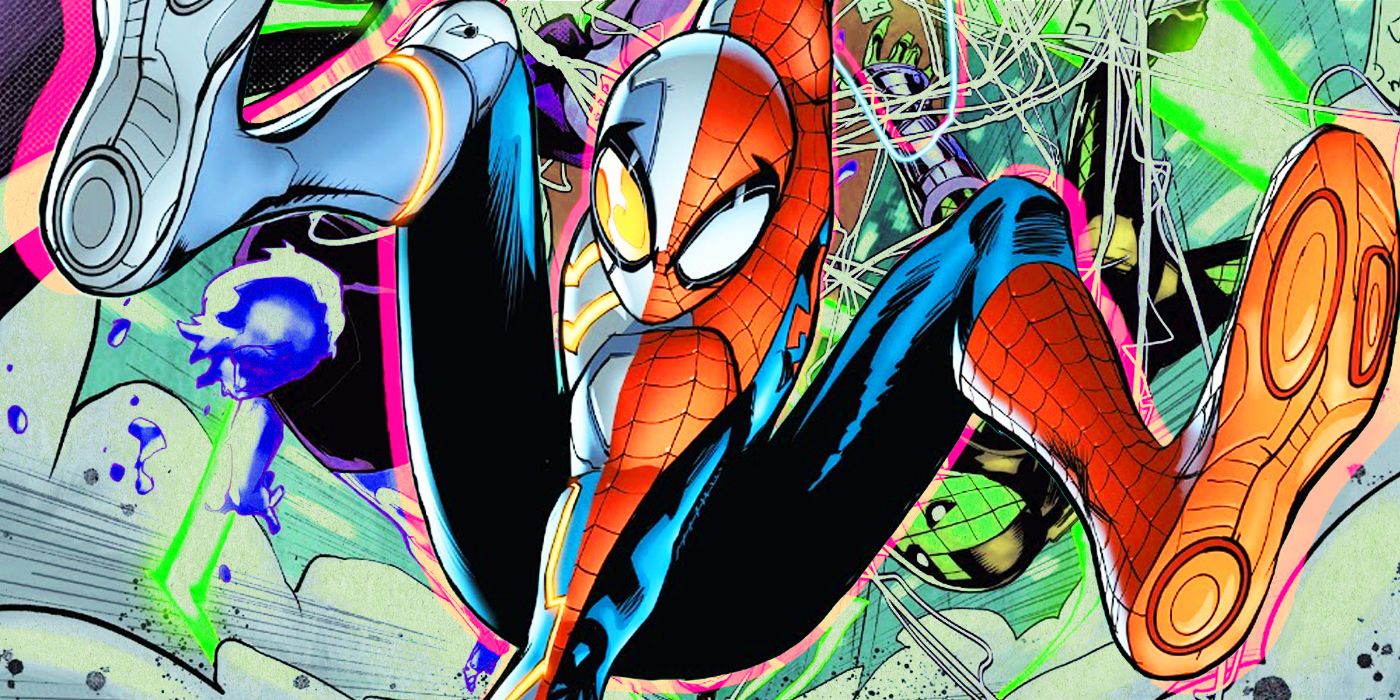In the latest issue of Amazing Spider-Man, Marvel’s iconic web-slinger takes on an entirely new role similar to that commonly held by a DC hero.
WARNING: The following article contains spoilers from Amazing Spider-Man #61 by Nick Spencer, Patrick Gleason, Edgar Delgado, and VC’s Joe Caramagna, on sale now.
People fall on hard times occasionally. They get strapped for cash and in order to make ends meet they sometimes do things that they’re not entirely proud of. And heroes, before anything else, are people. They need to eat, have a roof over their heads, and have a decent quality of life just like anybody else.
After the harrowing events involving Kindred, Peter had the chance to take stock of his living situation and realized he was nearing bankruptcy. And, even though he hated the thought, there was only one way he could think of to get out of it, at least for the moment: By becoming a corporate sellout.
In his defense, Spider-Man was in no way a fan of the idea and he never did it for fame or recognition. This was simply a way to pay the bills and ensure he can put food on his table. Peter had previously been approached by Norah Winters, the founder of Threat and Menaces, a tabloid news website that writes articles about the superhero community. Winters offered to sponsor the Web-Slinger in exchange for him livestreaming his exploits to their site. Peter initially rejected the offer, but desperate times call for desperate measures.
After changing his mind and accepting the offer, Peter found that his new job came with a few perks. Aside from the eye-widening salary, Spidey also got his hands on a brand new suit. This new suit enhanced his already formidable abilities, increasing his spider-sense with surveillance tech making it less likely that Spider-Man will get hit during combat. But the main purpose of the job was to share the Spider-Man experience with the public. He would livestream his patrols to people when he wanted to and they could even give feedback. Even better is that it increased Spider-Man’s popularity. Millions of people were scrambling to get a spot to watch the wall-crawler’s adventures.
Spider-Man’s new position has made him very much like several heroes who use sponsorship to increase their own popularity, most notably the DC heroes Booster Gold and the Manhattan Guardian. Ironically, Spider-Man’s new suit even shares slight similarities with Gold’s color scheme. But there are other similarities as well, particularly between Peter and the Manhattan Guardian.
Debuting in Seven Soldiers: The Manhattan Guardian #1 by Grant Morrison, Cameron Stewart, and Pat Brosseau, Jake Jordan was a disgraced former police officer who took up a job as a superhero and reporter for a local tabloid. Much like Spider-Man, Jake made this decision because he had few other places to turn. But in time, he grew to despise the changes to his life that being a sponsored hero brings. Peter is still early in his corporate career, but he’s already experiencing discomfort that may lead him to taking a road similar to Jordan’s.
And then there is the more well-known Booster Gold. He’s had quite a few sponsorships in order to finance his superhero career. Perhaps one of the best examples of this is when he quit the Justice League to form his own team, the Conglomerate, which was a group of superheroes led by Booster and funded by several corporate sponsors. Inevitably, the group fell apart as it was unable to effectively be heroic with their sponsors compromising their integrity.
All in all, it doesn’t paint a positive picture for Peter. He’s only just begun working for Threats and Menaces, but it’s already cramping his style, giving him voices in his ears that he doesn’t need, making his job a public spectacle, and even dictating what he should say simply to please viewers. Hopefully Spider-Man can find a more fulfilling way to pay the rent, but for now this seems to be his new normal.
About The Author

